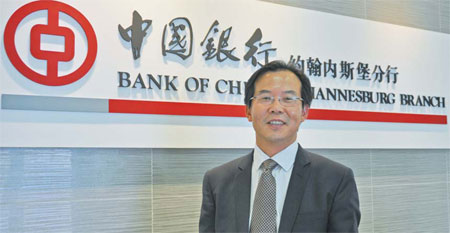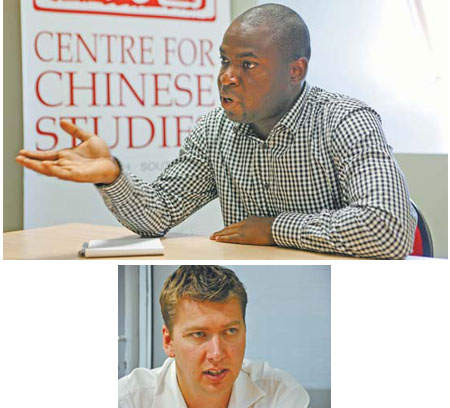Open for business
Updated: 2013-03-29 07:15
By Andrew Moody and Zhao Yanrong (China Daily)
|
||||||||
|
Qiu Zhikun is chief executive officer of Bank of China's Johannesburg branch. Zhao Yanrong / China Daily |
With leading African banks now also major players, the financial services market has been described as the new scramble for Africa. The local operators include South Africa-based Ned Bank and Ecobank of Togo, the latter with a presence in more than 30 African countries as well as in China, Dubai and London.
According to international management consultants Roland Berger, the banking sector in sub-Saharan Africa represents a huge growth opportunity.
It estimates that with four out of five adults on the continent having no access to banking services, there are $60 billion a year in deposits from low earners in Africa up for grabs alone.
With the banking markets in the United States and in Europe, in particular, being subdued, Africa is now one of the most attractive banking markets in the world.
"You have 50 years of growth you can potentially get out of the African market," says Voyt Krzychylkiewicz, banking analyst at SBG Securities at his office in Exchange Square in Johannesburg's Sandton district.
"It is obviously commodity rich, which is generally supportive of an economy, and so I think it has significant growth potential. I don't think banks, however, would view Africa as a substitute for having a London or US business."
But what of China's influence on the African banking sector? Is China a gamechanger?
The influx of Chinese banks and the vast trade now between China and Africa, worth $200 billion in 2012 according to official estimates, has had an impact in more ways than one in Africa.
Societe Generale, which wants to add a further 100 branches in sub-Saharan Africa to its existing 300, has revealed it sees expanding in Africa as a way of targeting Chinese companies, many of them involved in the minerals and resources sector.
Bernando Sanchez Incera, the bank's deputy chief executive, said it was easier to build a China presence in Africa than in China itself, where there are tight entry and expansion restrictions.
"Our presence in China is limited. In Africa, Chinese companies need a local agent who knows the international rules of the game," he told the Financial Times.
Krzychylkiewicz at SBG Securities says the Chinese banks have provided more capital to the market and generated more business activity.
"I think they have provided a lot more capital. The big trade and investment flows are likely to still come from China and what the Chinese banks have done has facilitated and accelerated some of this," he says.
He is less sure they have transformed the banking landscape and the financial services market in general in Africa.
|
Top: Daouda Cisse is research fellow at the Centre for Chinese Studies at Stellenbosch University in Western Cape. Mark Wessels / for China Daily Above: Voyt Krzychylkiewicz is banks analyst at SBG Securities. Zhao Yanrong / China Daily |
"I don't think they (the Chinese banks) are seen as broader financial services gamechangers. They haven't had as much impact on the domestic market as some people would have hoped," he adds.
It is easy to overlook how new the Chinese banks are to the banking scene in Africa. China Construction Bank, another of the Big Four Chinese state-owned banks, got its license to operate in South Africa on the same day as Bank of China in 2000.
"At the time it was quite amazing. China was quite unknown in South Africa," says Dr Windsor Chan, a Hong Kong-born veteran of South African banking, who is now deputy general manager of the bank in South Africa.
"When we first came here, it was not easy. A Chinese bank coming to Africa - people used to ask what are we doing here. Getting deposits was difficult in the first two years," he says.
Chan, 58, who used to work for Barclays in Hong Kong and came to South Africa originally in 1991 to work for Nedbank before joining CCB, says now people see Chinese banks as a haven for their money.
"Nowadays our deposit base is as big as a small second-tier local bank here. People see stories of the banking crisis in Europe and wonder where they can put their money more safely. A Chinese bank, of course, because it is backed by the Chinese government."
Chan, who was speaking in the bank's modern 5th floor offices in Sandton, says the bank has always been very keen to get African business as well as Chinese business. He estimates that nearly a third of all its business is local.
"We, of course, love to do business with Chinese state-owned enterprises, but it is not our only business. We want to be a regional player and not necessarily just a Chinese player."
Unlike ICBC, CCB does not have a direct stake in an African bank, but has a memorandum of understanding with First Rand Bank with which it works together on some deals.
"It is not an investment-type of thing, " Chan says. "We do not involve ourselves in their management and they don't engage on our side, but we share information and identify where we can do transactions together."
Such is the demand for Chinese banking services, the single branch that Bank of China opened in Zambia in 1997 is now the 8th largest bank in the country.

 Li Na on Time cover, makes influential 100 list
Li Na on Time cover, makes influential 100 list
 FBI releases photos of 2 Boston bombings suspects
FBI releases photos of 2 Boston bombings suspects
 World's wackiest hairstyles
World's wackiest hairstyles
 Sandstorms strike Northwest China
Sandstorms strike Northwest China
 Never-seen photos of Madonna on display
Never-seen photos of Madonna on display
 H7N9 outbreak linked to waterfowl migration
H7N9 outbreak linked to waterfowl migration
 Dozens feared dead in Texas plant blast
Dozens feared dead in Texas plant blast
 Venezuelan court rules out manual votes counting
Venezuelan court rules out manual votes counting
Most Viewed
Editor's Picks

|

|

|

|

|

|
Today's Top News
Boston bombing suspect reported cornered on boat
7.0-magnitude quake hits Sichuan
Cross-talk artist helps to spread the word
'Green' awareness levels drop in Beijing
Palace Museum spruces up
First couple on Time's list of most influential
H7N9 flu transmission studied
Trading channels 'need to broaden'
US Weekly

|

|










